Summer came hot and heavy to the mountain, and with it, the full weight of the season—and of the farm—pressed down on us. My foot, still recovering from Kicker’s stomps, ached with every step. Hours on the milking stool aggravated my sciatica, and each session felt like a test of endurance.
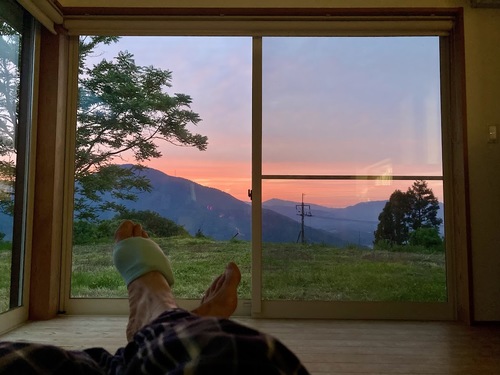
It wasn’t just me. The cows bore their own scars. Several had injured teats, yet we had to milk them regardless. Each time, despite our gentlest efforts, it was clear the cows were distressed. A sudden shove or panic kick sometimes knocked me off the stool, leaving me bruised and sore. One cow, Francis, had developed a habit of trying to smash her way out of the stanchion at the end of milking. No matter how much we calmed her beforehand, she would slam back against the bars with her horns—the sound ringing through the barn, jarring and traumatic. It was especially painful to hear, knowing a younger cow had recently stripped the outer layer of her horn.
We tried to soften their lives wherever we could—fresh towels, gentler handling, tick treatments, and cleaner barns—but each improvement reminded us of a difficult truth: the nature of the industry imposed limits. Even the best intentions could not erase the stress inherent in their lives.
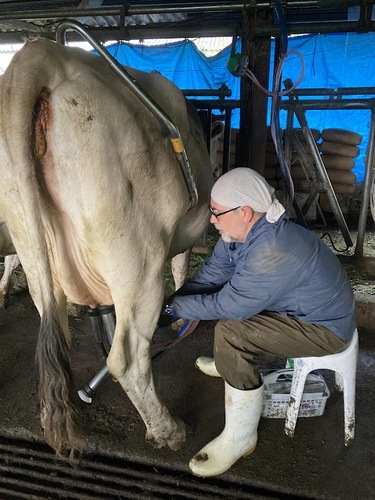
Then one afternoon,
It came to a head. We caught the old farmer striking Hanna, our youngest calf, who we had nursed back to health, with a metal bar. We tried to intervene. He shouted at us, insisting, “This isn’t a game!” To him, we were children playing at being farmers. Perhaps he was right. We believed that better treatment would make the cows happier, calmer, and healthier—and that these improvements would also benefit the milk—but in that moment, it felt painfully clear that our ideals clashed with the reality of the farm.
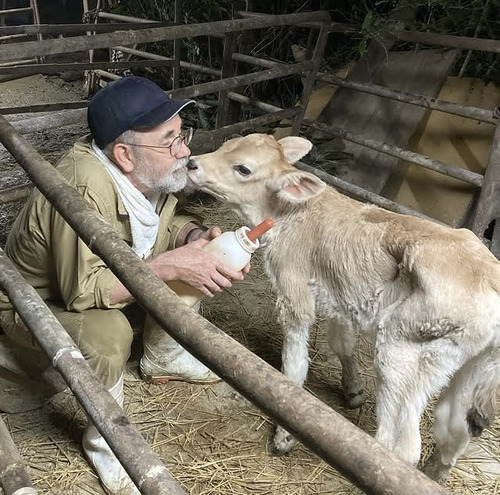
The magic had gone. What had felt like a shared adventure, a chance to care and nurture, had turned into an ethical and emotional reckoning. We realized we could not stay. With heavy hearts, we gave notice, said farewell to every cow, and left the mountain in July.
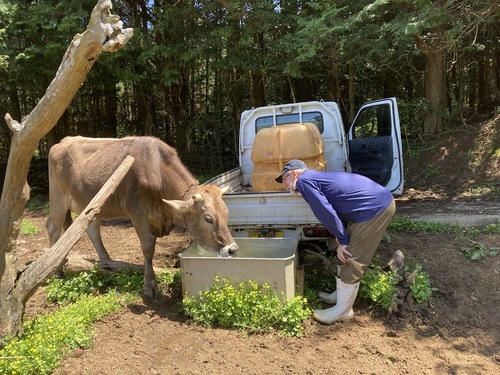
We returned to Shiga, to the lake where we had lived before. The water’s calm, familiar presence offered us a sense of peace and, we hoped, a chance for healing.

And we took Short with us. Unsure if anyone else would feed him, we tempted him into the house, caught him, and took him to the vet. As I write this, he’s meowing behind me, reminding me that it’s his lunchtime—a small, living thread of continuity and care in a season of endings.
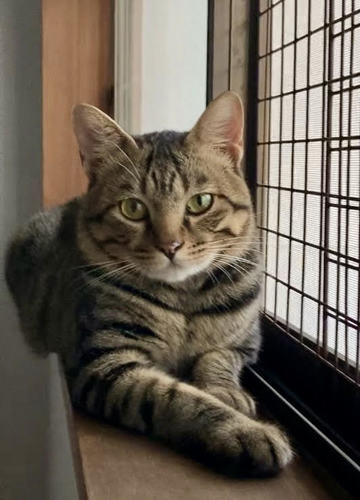
Learning Support
Vocabulary (less common/useful words)
- sciatica – pain along the sciatic nerve, usually in the lower back and leg.
- stanchion – a frame or device used to hold cows in place for milking.
- distressed – showing signs of pain, worry, or suffering.
- fate / limits / magic gone – expressions indicating unavoidable circumstances or loss of hope.
- reckoning – a moment of realization or confrontation, especially with difficult truths.
- hauling / clearing – carrying, removing, or tidying heavy things.
- adopted (Short) – to take responsibility for and care for an animal.
Collocations
- hit hard – the season or event was severe or difficult.
- flare up – sudden increase of pain or symptom (e.g., sciatica flared).
- sad goodbye / farewell – emotional departure from people or animals.
- small improvement – minor but noticeable positive change.
- messy, painful, frustrating – common adjectives used together to describe a difficult experience.
- played at being farmers – expression meaning acting like one, but not truly embodying it.
Phrasal Verbs
- hit hard – experience something strongly or severely.
- flared up – become suddenly worse (usually about pain or emotion).
- knock off – to cause someone to fall from a surface.
- settle into – get used to a routine.
- carry on – continue despite difficulty.
- catch up with – when consequences or reality arrive.
Idioms / Figurative Language
- played at being farmers – acting the part without full responsibility.
- magic gone – loss of excitement, hope, or charm.
- limits confronted – facing the realities that can’t be changed.
- small things like that help – an understated way of saying little positive actions matter.








Anthony H.
2025年 9月 29日
Thank you for reading all four Liz.
Liz English
2025年 9月 29日
What a hard decision to make, but it sounds like it was definitely the best one for all concerned. I applaud your efforts at more ethical and tender farming, and it really shines a light on the brutal realities of the industry. Thank you again for sharing your amazing journey.